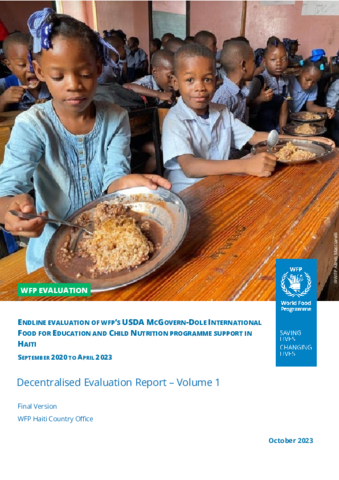
This is an evaluation for the World Food Programme’s (WFP) McGovern-Dole International Food for Education and Child Nutrition Programme support in Haiti. The evaluation consists of baseline and endline report. The main programme ran from September 2021 until June 2023 and was financed by the Foreign Agricultural Services (FAS) of the United States Department of Agriculture (USDA). This evaluation study was commissioned by WFP’s country office (CO) in Haiti and was executed by The KonTerra Group. The endline data collection took place between March and April 2023. The objective of both the baseline and the endline evaluation, is accountability to beneficiaries and donors as well as learning.
Besides the USDA and the WFP’s CO, the main intended users of this evaluation at the institutional level are the Ministry of Education (Ministère de l’Éducation Nationale et de la Formation Professionnelle - MENFP) and the National School Canteens Programme (Programme National de Cantines Scolaires - PNCS), both of which are directly involved with the subject of the programme. Other intended users are the direct implementing partners: Catholic Relief Services (CRS), the Bureau National de Développement (BND), the Ananda Marga Universal Relief Team (AMURT), and Plan International. The WFP Regional Bureau for Latin America and the Caribbean (RBP) may use the results for regional learning.
The baseline sets out the starting values of WFP’s McGovern-Dole programme in Haiti and a situational analysis of the baseline conditions. The baseline values and situational analysis were framed with the objective of informing the final evaluation questions that analysed the coverage, relevance, effectiveness, efficiency, sustainability and impact of the intervention. Three questions from USDA’s learning agenda will also be answered in the final evaluation: 1) School meal programme implementation: What community-level systems of governance and management are required for the successful implementation and sustainability of school meal programmes?; 2) Agricultural evidence gaps: How can a combination of local procurement at harvest time be supplemented with international food aid to promote a locally and/or nationally sustainable school meals programme?; and 3) Government investment: What types of incentives (and in what contexts) are most effective for securing local or national government investment in school meal programmes? What are the barriers and challenges to securing investment?
The key conclusions of the endline evaluation are:
- Apart from its reliance on imported food, the McGovern-Dole project is coherent with national policies and responds to the nutritional needs of school-age children.
- The extremely challenging global and national context has limited the project’s effectiveness and efficiency, though evidence suggests that project activities have moderated the negative effects of deteriorating contextual elements.
- Despite consistent adaptation (e.g., using sea routes for food transportation, delivering take-home rations, etc.), WFP has not achieved the expected distribution of food. While outputs largely implemented to plan, gaps in school and community resources are hindering changes at the strategic objective (SO) level.
- The main barriers to achievement of the programme’s objectives are:
- Teachers’ demotivation, leading to absenteeism
- Inadequate cooking environment and remuneration demotivates cooks
- Gaps in WASH infrastructure
- Limited community ownership.
- Meals provided through the McGovern-Dole project are cheaper per beneficiary compared to local purchase and home-grown school feeding approach if environmental costs and opportunity costs are not included.
- Not paying school cooks misses an opportunity to promote gender equality and women’s empowerment.
